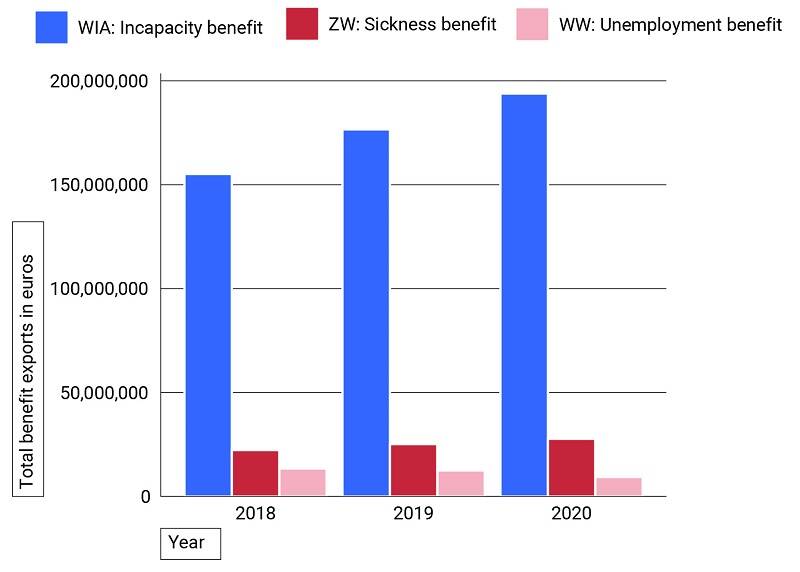UWV’s opportunities to provide services and perform checks outside the Netherlands are limited but used in full
Dutch benefit payments outside the Netherlands
The Netherlands Court of Audit concludes that the Employee Insurance Agency (UWV) has only limited opportunities to provide services and perform checks outside the Netherlands but is working constantly to make full use of them. About 2% of all the benefits paid out by the Employee Insurance Agency (UWV) every year are exported to people living outside the Netherlands. A small proportion of them are unemployment benefit payments. Incapacity benefits account for more than 88% of the total.

Adequate service provision and checks abroad
Services and checks outside the Netherlands are provided and performed mainly by competent foreign organisations. The UWV faces legal and practical restrictions outside the Netherlands. Germany’s stricter interpretation of EU privacy laws, for instance, means certain information is denied to the UWV. The social security systems in, for instance, Germany, Spain and Poland are not organised nationally and relevant information cannot be accessed centrally. Furthermore, clients outside the Netherlands cannot always use the DigiD identification system. It is accordingly far more difficult for the UWV to receive correct and timely information.
| Most people who receive employment-related benefit exports are frontier workers who are employed in the Netherlands but live in Germany or Belgium, or are migrant workers who receive an incapacity benefit and return home to, for instance, Turkey or Morocco. Most unemployment benefit exports are received by seasonal workers who return to, for example, Poland at the end of their short and flexible temporary contracts. They are entitled to a Dutch benefit because they have paid Dutch employee contributions. |
We found that, in the circumstances, the UWV works hard to perform its tasks abroad. Furthermore, the UWV tries to supplement existing benefit conventions with additional agreements. It recently reached agreement on an alternative to home visits in Poland. It has also made agreements with its Polish and Spanish counterparts regarding the recovery of excess payments and the exchange of information, and it has reached agreements on job placements for unemployment benefit recipients even though it has no legal responsibility in this area. The UWV could step up the reintegration services it provides, especially to the partially incapacitated. In practice, the UWV restricts its reintegration services for the ill and the incapacitated mainly to the labour market in the Dutch border region and Poland.
Lack of data prevents insight into quality
The quality of the UWV’s services and checks outside the Netherlands is not known because relevant data is not available. Such insight is essential in view of the problems encountered abroad when registering addresses and contacting clients directly.
Unemployment benefit exports few and declining
Unemployment benefits amount to 2% of all benefit exports. This is because they cannot be exported for more than 3 months, whereas other employee benefits can be received outside the Netherlands for far longer. In the period audited, the number of unemployment benefit recipients abroad fell by 30%, partly because of the COVID-19 pandemic. Many migrant workers returned home when the companies they worked for had to close their doors. Many did so without first working for 4 weeks, a condition for unemployment benefit exports.
Very limited impact of longer unemployment benefit exports
The EU is debating a proposal to extend the right to receive unemployment benefit in the European Economic Area and Switzerland from 3 to 6 months. The Dutch government has consistently opposed this proposal. The Court of Audit found that only 21% of the 10,800 unemployment benefit recipients outside the Netherlands in 2018-2020 would have been eligible for 6 months (on average 741 people per annum). Most of the recipients had worked on short-term contracts that did not entitle them to a long-term benefit.
More incapacity benefit exports
Incapacity benefit payments (including those provided under the work and income scheme and the former invalidity insurance scheme) account for most of the benefit exports (88%). The number of incapacity and sickness benefit exports increased during the period audited, 2018-2020. Their number will probably increase in the future as more people live and work in different countries.

Recommendations
The Court of Audit recommends that the Minister of SZW and the UWV extend foreign reintegration services to more countries than just Belgium, Germany and Poland, that they gather information on the quality of the services provided abroad and consider employing multilingual staff.
Response of the Minister of SZW/UWV and the Court of Audit’s afterword
The minister observes that the UWV is currently taking steps to extend its reintegration services to more countries than just Belgium, Germany and Poland. Its efforts, however, are subject to a cost-benefit analysis that will take account of the composition of the client base, the openings in the local labour market and the scope for cooperation with the countries concerned. The UWV will study opportunities to employ interpreters or multilingual staff in more departments where advantageous. We welcome the intention of the minister and the UWV’s Executive Board to improve the provision of services abroad, in part through the employment of multilingual staff and the use of qualitative information from benefit recipients. Insight into quality, as the minister and UWV acknowledge, is of vital importance to improve the quality of services and checks outside the Netherlands, particularly in view of the many problems encountered when implementing these tasks.
The minister notes in her response that an amendment of the relevant EU directive would increase benefit exports, although it is not yet clear to what extent. As we state in our report, the precise impact of the proposed amendment cannot be foreseen, but existing information suggests it will probably not be significant.